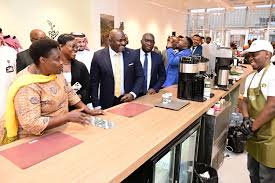In the heart of Mlandizi Mtongani village, in Tanzania’s Coast Region, lives Amina Ally, a woman whose story shines with courage, hope, and transformation.
Amina was born healthy, but at the age of six, her life took a sudden turn when a mysterious illness left her physically disabled. Since then, she has spent over five decades overcoming barriers that might have broken others.
For years, Amina worked as a petty trader, selling groundnuts to feed her family. Despite her hard work, her small income was never enough to cover basic needs. Yet, she refused to give up.
Everything changed in 2014, when Amina became a beneficiary of the Tanzania Social Action Fund (TASAF)—a government initiative designed to support poor and vulnerable households through financial aid and skills training.
“I started with 30,000/-,” Amina recalls with pride. “Through TASAF, I learned how to make batiki (tie-dye fabric). That skill changed my life.”
With training and guidance, Amina turned her creativity into a thriving small business. From that small beginning, her capital has now grown to 500,000/-, and she earns steady profits from selling her colorful fabrics in local markets.
“Without TASAF, I would never have been able to grow my business,” she says. “Now I am not just surviving—I am living.”
Amina’s life today is far from easy. Her disability limits her mobility, and she struggles to manage housework when her husband is away working. But her spirit remains strong.
“I don’t have a helper at home,” she says softly. “But I do what I can, and I thank God for every day.”
Through TASAF, Amina found not only financial independence but also dignity and confidence. She is now a role model for other people with disabilities in her community, proving that determination and opportunity can change lives.
“TASAF gave me tools to build my own life,” she adds. “Now I want others to believe they can do the same.”
Hundreds of kilometers away, in Kigogo, one of Dar es Salaam’s busiest yet most underserved neighborhoods, lives Nuru Mohammed Ali, a 48-year-old mother of four.
Life in Kigogo is tough, and for Nuru, it has been even harder. A severe eye infection in her twenties left her blind in one eye—but not in spirit.
Every morning, as the city wakes up, Nuru is already at her small workshop, weaving baskets, making handmade bags, and crafting soaps with a sweet lemongrass scent that locals love.
Before TASAF, Nuru’s life was a daily struggle. Her husband worked as a day laborer, and she often had to choose between buying food and paying her children’s school fees.
That changed in 2014, when she too joined TASAF’s cash transfer program. With the funds, Nuru bought better tools and materials for her craftwork. She also attended financial literacy training, where she learned how to save and manage money wisely.
“For the first time, I could breathe,” she says. “I managed to buy school uniforms for my children and even got a proper table for my work.”
Over the years, her business grew, and she began teaching other women in Kigogo how to make soaps and baskets—helping them earn an income just as she did.
Now, as TASAF begins phasing her out as a direct beneficiary, Nuru feels a mix of pride and worry. “It’s scary,” she admits. “The market is tough, and materials are expensive. But I’ve come this far—I won’t give up.”
She dreams of opening a small shop to showcase her products and those made by other women she’s trained. “I may have only one eye,” she says with a smile, “but I see a future worth fighting for.”
Both Amina and Nuru are living examples of how TASAF has transformed lives across Tanzania. Through its cash transfers and training programs, TASAF empowers people—especially women, persons with disabilities, and low-income families—to become self-reliant.
The program also encourages families to invest in education, health, and nutrition, ensuring long-term benefits for future generations.
As Tanzania marks the International Day of Persons with Disabilities, stories like Amina’s and Nuru’s remind us that inclusion and opportunity can break barriers, restore dignity, and build a stronger nation.
From the quiet village of Mlandizi to the bustling streets of Kigogo, these two women stand as beacons of resilience. Their stories remind us that disability is not inability, and that with support and determination, even the smallest opportunities can grow into powerful transformations.
TASAF’s legacy lives not only in the lives it has lifted but also in the hope it has inspired—hope stitched in batiki patterns, woven into baskets, and scented in lemongrass soap.



